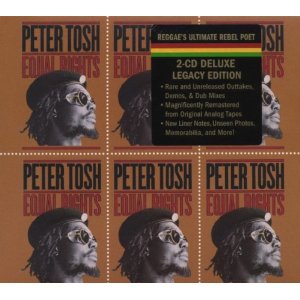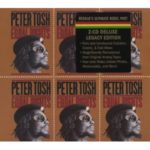
Equal Rights (Legacy Edition)
Legalize It (Legacy Edition)
Columbia/Legacy
Columbia/Legacy’s new editions of the late Peter Tosh’s first two solo albums – Legalize It and Equal Rights – have something to offer everybody. If you have no Tosh in your musical library (and why not?), you’ll find no better place to start than this pair of double-CD sets. And if you do own the original albums, I can still make a damn good case for looking into these, as there is plenty of music here that I’m betting you’ve never put an ear to before now. As easy as it always is to be skeptical of any re-release that contains “previously unreleased” material to sweeten the deal, these two albums deserve to be paid attention to. The bonus material on either – everything from demo versions of Tosh classics to blissed-out dub mixes – could stand on its own. And the new essays included in the liner notes (absolute real-thing reggae scholar Roger Steffans contributes to Legalize It, while Tosh’s former manager Herbie Miller shares some wonderful history for Equal Rights) add to the feeling of the sets being offered with the proper amounts of respect and love for a legend and his music.
Though the title song on Legalize It may almost seem like a cliché to some these days, you don’t have to do a whole lot of historical research to get a bearing on just how brave, radical, and revolutionary a move it was for Tosh to release such a tune back in 1976. Remember: his message was targeted at the whole world – not just his homeland of Jamaica – and put more than just his musical career at stake. The Legacy Edition of Legalize It begins with the original album version of the title song and ends with a seven-minute dub mix that includes a public service announcement Tosh recorded for NORML in 1976 while touring the US. In between you’ll find – along with the entire original album – demos of many of the songs, plus Tosh’s own homegrown mix of the nine cuts on Legalize It. The emotions span the gamut from the playful sexiness of “Ketchy Shuby” to the challenge of “Whatcha Gonna Do”, which addresses police brutality (something Tosh was no stranger to). Disc Two also contains a half-dozen dub versions of tunes from the album, all either previously unreleased or known only to collectors of the rare and obscure. Audiophiles take note: any imperfections in these vintage recordings only add to the flavor … take it in, savor it, and mellow out in true time-machine-style bliss. Over-polishing these tracks would’ve taken the life right out of them.
Tosh released Equal Rights in 1977, managing to produce a focused masterpiece as his homeland experienced some of the worst civil unrest in its history. Violence among political gangs, police, and soldiers was the norm, with everything from power outages and police roadblocks to curfews and bloody riots affecting Tosh and his fellow musicians’ ability to record. Some would have chosen an easier path for their career; Tosh plunged deep into the social and political upheaval around him. He was what he said he was and lived the life that he sung about. The bold stand of “Steppin’ Razor” would’ve been a gimmick for some – Peter Tosh was the “Steppin’ Razor”. (The song is offered here in both its original form and in a dub plate version called “Heavy Razor”.) In the end, the stand he chose to take undoubtedly cost Peter Tosh his life (the facts surrounding his assassination-style slaying in 1987 remain cloudy to this day), but it seems unlikely that he would have chosen to live any other way, regardless of the outcome.
Besides the original eight songs that made up Equal Rights the Legacy Edition offers seven outtakes that were recorded during those same sessions. Second-guessing Tosh’s decisions on what to include and what to set aside at this point in time would be foolish, if not outright sacrilegious. It needs to be noted that there are artists who spend their whole lives trying to write songs as powerful as “You Can’t Blame The Youth” or “Hammer” or “400 years” – but they simply didn’t blend into the sequence that Tosh wanted for the original album. In this setting, however, it makes for an impressive 15-song first disc.
The second half of the Legacy Edition of Equal Rights is full of dub versions of tunes, along with a powerful extended versions of the title song and the brilliant “Apartheid”. The classic “Downpressor Man” resurfaces here as “Dub-Presser Man”, reconstructed without losing one bit of its bite; “Jah Man Inna Jamdung” embraces the dub setting, taking on bottomless depth; and in amongst the atmospheric mix of the dub plate version of “I Am That I Am” is a diplomacy that is (unfairly) not often acknowledged.
“Get Up, Stand Up” may be best known as one of Bob Marley’s anthems to many (it was to be the last song he ever performed live), but he originally co-wrote the song with Peter Tosh. (Tosh, of course, was a Wailer for 10 years before going solo in 1975.) It is only fitting that “Get Up, Stand Up” bookends Equal Rights, ushering in Disc 1 and closing the collection out in a previously-unreleased extended version at the end of Disc 2. Where Marley’s original contribution to the song ended and his co-author’s took over we’ll never know, but when Tosh delivers the punch – “You can fool some people sometimes, but you can’t fool all the people all the time” – he owns that song.
Both of these new releases pay great tribute to the art, vision, and courage of Peter Tosh, from the song selections and sequencing to the packaging. Nicely done, Columbia/Legacy – nicely done.



No Comments comments associated with this post